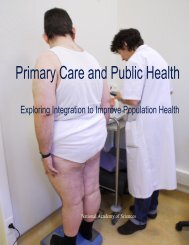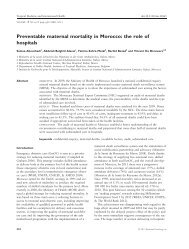- Page 2:
Preventing Childhood Obesity Eviden
- Page 6 and 7:
Preventing Childhood Obesity Eviden
- Page 8 and 9:
Contents Foreword, vii Contributors
- Page 10:
Foreword Obesity became a major hea
- Page 13 and 14:
Contributors Rob Carter PhD Head, H
- Page 15 and 16:
Contributors Shiriki Kumanyika PhD,
- Page 18:
Preface If we had all the evidence,
- Page 22 and 23:
CHAPTER 1 The c hildhood o besity e
- Page 24 and 25:
Childhood obesity epidemic Table 1.
- Page 26 and 27:
Childhood obesity epidemic explain
- Page 28 and 29:
Childhood obesity epidemic Table 1.
- Page 30 and 31:
Childhood obesity epidemic hepatiti
- Page 32 and 33:
Childhood obesity epidemic 15 Shiel
- Page 34 and 35:
CHAPTER 2 Lessons from the c ontrol
- Page 36 and 37:
Lessons from the control of other e
- Page 38 and 39:
Lessons from the control of other e
- Page 40 and 41:
Lessons from the control of other e
- Page 42 and 43:
Childhood obesity prevention overvi
- Page 44 and 45:
Childhood obesity prevention overvi
- Page 46 and 47:
Childhood obesity prevention overvi
- Page 48 and 49:
Childhood obesity prevention overvi
- Page 50 and 51:
CHAPTER 4 No c ountry for f at c hi
- Page 52 and 53:
No country for fat children? Ethica
- Page 54 and 55:
No country for fat children? Ethica
- Page 56 and 57:
No country for fat children? Ethica
- Page 58 and 59:
No country for fat children? Ethica
- Page 60 and 61:
A human rights approach to childhoo
- Page 62 and 63:
A human rights approach to childhoo
- Page 64:
A human rights approach to childhoo
- Page 67 and 68:
Part 2 community and government age
- Page 69 and 70:
Chapter 6 Questions Evidence needed
- Page 71 and 72:
Chapter 6 ioral determinants rather
- Page 73 and 74:
Chapter 6 These issues are particul
- Page 75 and 76:
Chapter 6 15 Carrel AL , Bernhardt
- Page 77 and 78:
Chapter 7 at the state level to app
- Page 79 and 80:
Chapter 7 prevention efforts, parti
- Page 81 and 82:
Chapter 7 interventions. This appro
- Page 83 and 84:
CHAPTER 8 Evidence of the i nfl uen
- Page 85 and 86:
Chapter 8 choices in adolescence, 1
- Page 87 and 88:
Chapter 8 itself is unlikely to res
- Page 89 and 90:
Chapter 8 20 Cullen K , Baranowski
- Page 91 and 92:
Chapter 9 meal frequency, decreased
- Page 93 and 94:
Chapter 9 were behavioral (parent -
- Page 95 and 96:
Chapter 9 changes regarding partici
- Page 97 and 98:
Chapter 9 36 Campbell KJ , Hesketh
- Page 99 and 100:
Chapter 10 condition obesity in chi
- Page 101 and 102:
Chapter 10 the release of energy an
- Page 103 and 104:
Chapter 10 whereas Flynn et al 25 a
- Page 105 and 106:
Chapter 10 11 Baranowski T : Advanc
- Page 107 and 108:
CHAPTER 11 Obesity p revention in s
- Page 109 and 110:
Chapter 11 translation (see Chapter
- Page 111 and 112:
Chapter 11 overweight and obesity r
- Page 113 and 114:
CHAPTER 12 The p revention of c hil
- Page 115 and 116:
Chapter 12 Selective prevention pro
- Page 117 and 118:
Chapter 12 Table 12.1 Recommendatio
- Page 119 and 120:
Chapter 12 Table 12.1 Continued Gui
- Page 121 and 122:
Chapter 12 short - and long - term
- Page 123 and 124:
Chapter 12 33 Woo KS , Chook P , Yu
- Page 125 and 126:
Chapter 13 There is a relatively sm
- Page 127 and 128:
Chapter 13 Modifying the b uilt e n
- Page 129 and 130:
Chapter 13 capacity to support chil
- Page 131 and 132:
Chapter 13 45 Staunton C , Hubsmith
- Page 133 and 134:
Chapter 14 Changes in the food envi
- Page 135 and 136:
Chapter 14 Promising interventions
- Page 137 and 138:
Chapter 14 10 USDA - ERS : Food CPI
- Page 139 and 140:
CHAPTER 15 Food and b everage m ark
- Page 141 and 142:
Chapter 15 Box 15.1 The findings of
- Page 143 and 144:
Chapter 15 Food, however, is not to
- Page 145 and 146:
Chapter 15 competitive analysis eac
- Page 147 and 148:
Chapter 15 behaviour: exploring the
- Page 149 and 150:
Chapter 16 pawn or sell possessions
- Page 151 and 152:
Chapter 16 obesity and that this ma
- Page 153 and 154:
Chapter 16 impact of this deprivati
- Page 155 and 156:
Chapter 16 10 Marin - Leon L , Sega
- Page 157 and 158:
CHAPTER 17 Socio - c ultural i ssue
- Page 159 and 160:
Chapter 17 The s ocio - c ultural e
- Page 161 and 162:
Chapter 17 with limited access and/
- Page 163 and 164:
Chapter 17 What else can be done to
- Page 165 and 166:
Chapter 17 55 Grier S , Kumanyika S
- Page 167 and 168:
Chapter 18 Ironically, these countr
- Page 169 and 170:
Chapter 18 key environmental factor
- Page 171 and 172:
Chapter 18 countries precludes the
- Page 173 and 174:
Chapter 18 7 Jafar TH , Qadri Z , I
- Page 176 and 177:
CHAPTER 19 Evaluation of c ommunity
- Page 178 and 179:
Evaluation of community-based obesi
- Page 180 and 181:
Evaluation of community-based obesi
- Page 182 and 183:
Evaluation of community-based obesi
- Page 184 and 185:
Evaluation of community-based obesi
- Page 186 and 187:
CHAPTER 20 Economic e valuation of
- Page 188 and 189:
Economic evaluation of obesity inte
- Page 190 and 191:
Economic evaluation of obesity inte
- Page 192 and 193:
Economic evaluation of obesity inte
- Page 194 and 195:
CHAPTER 21 Monitoring of c hildhood
- Page 196 and 197:
Monitoring of childhood obesity Non
- Page 198 and 199:
Monitoring of childhood obesity Noo
- Page 200 and 201:
Monitoring of childhood obesity Tab
- Page 202 and 203:
Monitoring of childhood obesity 11
- Page 204 and 205:
Knowledge translation and exchange
- Page 206 and 207:
Knowledge translation and exchange
- Page 208 and 209:
Knowledge translation and exchange
- Page 210 and 211:
Knowledge translation and exchange
- Page 212 and 213:
The role of advocacy Why d o w e n
- Page 214 and 215:
The role of advocacy mate long - te
- Page 216 and 217:
The role of advocacy position put o
- Page 218:
The role of advocacy 6 Yach D , Haw
- Page 221 and 222:
Part 4 infrastructure, funding or r
- Page 223 and 224:
Chapter 24 by examining why policy
- Page 225 and 226: Chapter 24 has privileged the manuf
- Page 227 and 228: Chapter 24 case study is an analysi
- Page 229 and 230: Chapter 24 by being highly visible
- Page 231 and 232: CHAPTER 25 Developing the political
- Page 233 and 234: Chapter 25 Involuntary: all society
- Page 235 and 236: Chapter 25 Shiriki Kumanyika and co
- Page 237 and 238: Chapter 25 The next steps Given the
- Page 239 and 240: CHAPTER 26 Community i nterventions
- Page 241 and 242: Chapter 26 Table 26.1 The health pr
- Page 243 and 244: Chapter 26 consider and build on th
- Page 245 and 246: Chapter 26 programs and messages be
- Page 247 and 248: Chapter 26 Victoria, Australia. The
- Page 249 and 250: Chapter 26 participants for appropr
- Page 251 and 252: CHAPTER 27 Community c apacity b ui
- Page 253 and 254: Chapter 27 level and macro - change
- Page 255 and 256: Chapter 27 & Chomp ” where the co
- Page 257 and 258: Chapter 27 Box 27.4 Excerpt from Go
- Page 259 and 260: Chapter 27 Table 27.1 Capacity buil
- Page 261 and 262: Chapter 27 38 Borys Jean - Michel :
- Page 263 and 264: Chapter 28 Box 28.1 The EPODE progr
- Page 265 and 266: Chapter 28 Figure 28.1 For parents:
- Page 267 and 268: Chapter 28 Figure 28.2 Promoting ph
- Page 269 and 270: Chapter 28 marketing, there is ofte
- Page 271 and 272: Chapter 28 social problems. The art
- Page 273 and 274: Chapter 29 length gain observed in
- Page 275: Chapter 29 tissue deposition relate
- Page 279 and 280: Chapter 29 7 Cole TJ , Bellizzi MC
- Page 281 and 282: Chapter 29 environmental approaches
- Page 283 and 284: Chapter 30 it all on their own, sin
- Page 285 and 286: Chapter 30 Forty - three countries
- Page 287 and 288: Chapter 30 Box 30.2 Elements of the
- Page 289 and 290: Chapter 31 childhood obesity rates
- Page 291 and 292: Chapter 31 became inactive or was t
- Page 293 and 294: Chapter 31 healthy diets and portio
- Page 295 and 296: CHAPTER 32 Working with m inority g
- Page 297 and 298: Chapter 32 and reflect the circumst
- Page 299 and 300: Chapter 32 inclusion and exclusion
- Page 301 and 302: Chapter 32 3 Mercer SL , Vinney JD
- Page 303 and 304: Chapter 33 % of total DALYs lost 2
- Page 305 and 306: Chapter 33 Finally, within a given
- Page 307 and 308: Chapter 33 urbanized and have aband
- Page 309 and 310: Chapter 33 Box 33.1 Recommendations
- Page 311 and 312: CHAPTER 34 Preventing c hildhood o
- Page 313 and 314: Chapter 34 with a plateau in cigare
- Page 315 and 316: Chapter 34 segments of the populati
- Page 317 and 318: Index academic performance 11, 264
- Page 319 and 320: Index evidence-based and evidence-i
- Page 321 and 322: Index community-based 33, 58, 151,
- Page 323 and 324: Index parental support 67 PE 25, 81
- Page 325: Index Minnesota Heart Heath Project

















